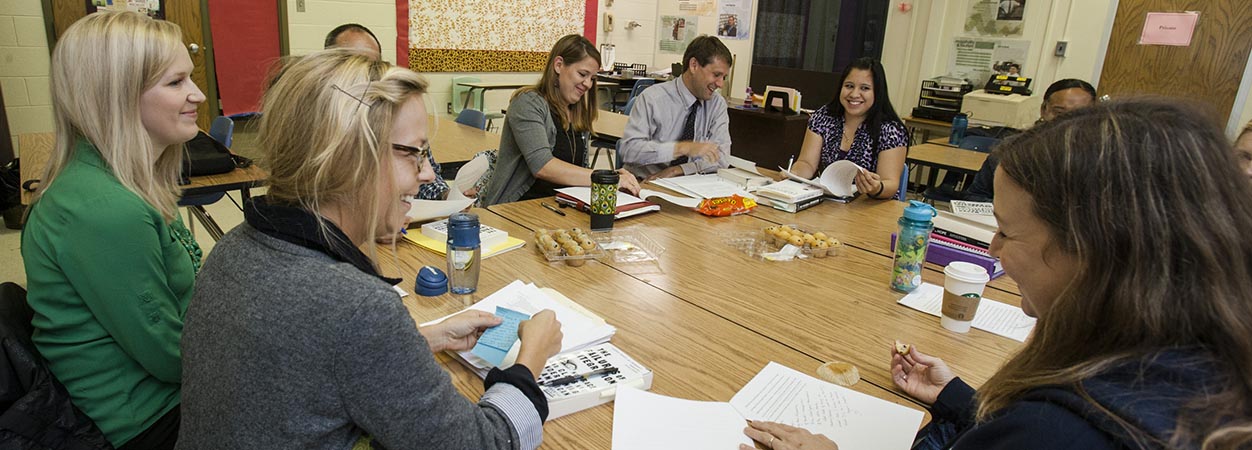Partnerships

Metropolitan Educational Alliance
The Metropolitan Educational Alliance (META) is a partnership among Chesterfield County Public Schools, Hanover County Public Schools, Henrico County Public Schools, Powhatan County Public Schools, Richmond Public Schools, and the VCU School of Education. Established in 2001, META's mission is to enhance teaching quality in the Metro Richmond area by identifying needs, opportunities and resources for strategic professional development with the goal of improving student learning by improving the preparation, effectiveness and retention of high-quality teachers. The META Planning Council consists of the staff development directors or other designated representatives from partner school divisions, the VCU clinical faculty coordinator, the chair of the Department of Teaching and Learning, and the director of the Center for Teacher Leadership (CTL).
Since 2001, CTL has secured more than $13 million to advance the work of the META partnership.
Current META Projects
The National Board Support Program is for teachers seeking National Board Certification. Conducted by CTL at the VCU School of Education, the program provides teachers in the META school divisions with structured opportunities to clarify each aspect of the certification process and a network of support as they strive to meet the highest standards established for the profession. CTL also supports a National Board Candidate Support Listserv where candidates can network with other candidates and National Board Certified Teachers across the state.
The VCU Clinical Faculty Program identifies exemplary K-12 teachers who want to work with VCU pre-service teachers and provides them with professional development to become effective mentors. To earn the Clinical Faculty designation, teachers in the META divisions must submit a written application, complete five modules of training, and submit a portfolio, including a video or audio of a coaching session, to demonstrate their skill as a coach.
The Clinical Faculty training is based on the Santa Cruz New Teacher Center mentor teacher training. CTL is one of only two national training sites licensed to conduct this highly successful and widely recognized mentoring system.
Completed Projects
Completed in 2010 and based on the Santa Cruz New Teacher Center mentoring model, the BTA Program provided intensive, weekly support for two years to 347 beginning teachers in 62 high-needs schools in the META school divisions. Santa Cruz-trained BTAs (full-time mentors) collected observation data and used formative assessment tools to help beginning teachers analyze their practice. The model is based on the belief that learning to teach is a career-long developmental process that involves a continuous cycle of planning, teaching and reflecting. Evaluation of the program included an experimental design testing the effectiveness of the BTA Program vs. traditional mentoring models.
Our research indicates six key components that must be present in order to ensure a high quality induction program:
- A highly competitive selection process. Mentors are carefully selected using a clear, open process which carefully articulates the mentor role. Stakeholders in the process include district, site and university personnel.
- High quality training. A summer orientation and ongoing Santa Cruz Mentor Trainings in Years 1 and 2 combine with a summer seminar to provide strong support for new mentors.
- Ongoing professional support. Mentors participate in a learning community called Friday Forum that supports their use of formative assessment tools and mentoring protocols.
- Time to coach. Mentors need time for intensive coaching with each beginning teacher. The focus for this collaborative partnership is on improving instruction.
- Formative assessment tools. The New Teacher Center Formative Assessment system includes a set of mentoring tools and protocols to guide the mentor and beginning teacher in gathering and analyzing data of practice in order to improve classroom instruction and student achievement.
- Confidentiality. A strong, trusting relationship is a critical element in a successful collaborative partnership, allowing the mentor and new teacher to focus on advancing the classroom teacher's practice and improving student achievement.
Completed in 2005, the High-Q Para Program assisted instructional aides in the META divisions to meet the federal “highly qualified” definition. Five hundred paraprofessionals were pre-tested and provided either a refresher or in-depth course to prepare them to pass the ParaPro examination.
The META Special Education Program for Instructional Assistants (META SEPIA) is an alternative licensure program designed for instructional assistants with at least a bachelor’s degree to earn a Virginia collegiate (K-12) professional license in special education, general curriculum. Instituted in 2002, the program was revised in 2008 to meet Virginia Department of Education licensure regulations for special education, general curriculum and expanded to include paraprofessionals from other Region 1 divisions.
META-SEPIA has now evolved into the Certificate in Special Education K-12 Teaching, an online certification program for individuals interested in becoming fully licensed special education teachers in Virginia.
In 2009, META received the first Dr. Shirley S. Schwartz Urban Education Impact Award. This award is given annually by the Council of Great City Schools and the Council of Great City Colleges of Education to recognize the partnership with the greatest impact on urban education.
Virginia Commonwealth University is a nationally renowned public research institution dedicated to the success and well-being of all members of its community. VCU student, faculty and staff groups and associations are open without regard to any characteristic or identity protected by law.